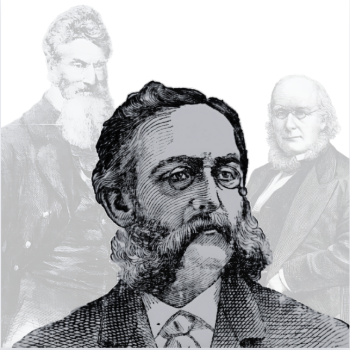I once saw a bumper sticker in Waco that read "If It's Not King James, It's Not the Bible." These days, that kind of staunch devotion to the King James Version (KJV) is rare. The New International Version and other translations have largely taken the KJV's place in American Christianity. But on the anniversary of the KJV's printing, which is traditionally thought to have happened four hundred years ago this week, on May 2, 1611, Christians and other admirers of the Bible should pause to reflect on the most important book ever published in English. Commemorations are taking place all over the English-speaking world, including one recently convened by my colleagues and I from Baylor University's Institute for Studies of Religion, featuring presentations by Mark Noll, Lamin Sanneh, Philip Jenkins, and others.
The assertion of the KJV's singular significance in publishing history may seem bold. But is there another contender? The KJV is easily the most printed book in human history. It is a constant presence in great British and American literature; its phrases have routinely appeared in famous political addresses, from Patrick Henry's "Liberty or Death" speech, to Abraham Lincoln's Second Inaugural, to Martin Luther King's "I Have a Dream." And of course, for three hundred and fifty years the KJV was simply the Bible for Protestants in the English-speaking world.
The KJV's publication signaled the triumph of the Reformation in England, or at least the belief that the Bible should be available in the vernacular language. John Wycliffe and William Tyndale were the trailblazers in England. Tyndale's 1526 translation was burnt as a "pestiferous and most pernicious poison," and Tyndale himself was subsequently burnt as a heretic in Belgium.
But by 1611, the moderate Anglican King James I had become convinced that there needed to be a standard English-language translation. King James's translators depended heavily on earlier English translations; more than three-quarters of the 1611 KJV derives from Tyndale's Bible. The KJV cemented the notion articulated in 1637 by theologian William Chillingworth that the Bible, and "the Bible only, is the religion of Protestants."
In his delightful Bible: The Story of the King James Version, Gordon Campbell (also a presenter at the Baylor conference) tells the fascinating and occasionally hilarious story of how the KJV "came to pass." Putting God's Word into English involved a host of vivid personalities and unfortunate happenstances, the most acute of the latter being the "Wicked Bible" of 1631, which (intentionally?) omitted the word "not" from the seventh commandment, "Thou shalt not commit adultery."
In the late 19th century, academics influenced by higher criticism began to argue that the KJV (and the original manuscripts) could no longer be considered the inspired Word of God. However, some said, the English Bible could still be admired as great literature. This is a view still propounded today, although I cannot imagine many people reading the Bible avidly without believing it is true. Of course, some notable figures have seen the Bible as authoritative in its moral precepts, especially the teachings of Christ, but not in its claims about miracles and Jesus' divinity. In America, Benjamin Franklin and Thomas Jefferson took this approach to the KJV.
Bible-believing Christians have found this ethical approach unacceptable—How can we pick and choose which of the Bible's claims to believe? Most people who regularly read the Bible will receive it as a guide not just to morality, but to salvation. C.S. Lewis, Campbell points out, argued against the notion of the Bible as literature. "I cannot help suspecting . . . that those who read the Bible as literature do not read the Bible," he said.
The Bible is primarily the story of man's sin and God's work of redemption, and no version has put that story in such compelling prose as the KJV. The days of the KJV's dominance are gone, but in the Bible's most famous verses, its cadences reverberate. As John 3:16 says in the King James, "For God so loved the world, that he gave his only begotten Son, that whosoever believeth in Him should not perish, but have everlasting life." That still sounds like the Bible to me.
5/3/2011 4:00:00 AM





